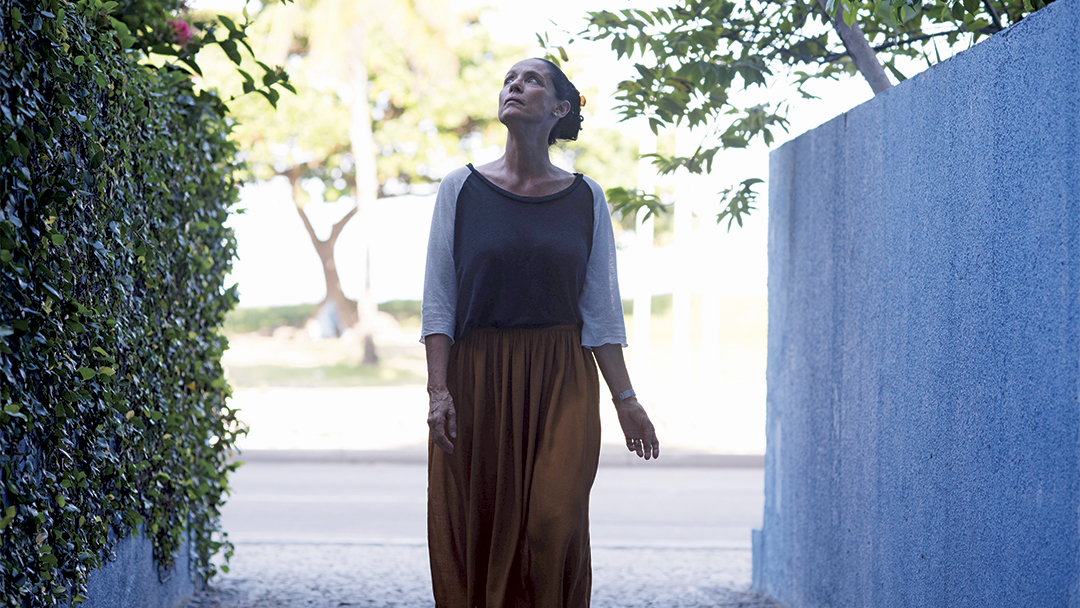The fallout of Brazil’s turbulent politics has caught up with the selection of the country’s Oscar candidate. Three contenders have withdrawn from the race in support of Cannes entry “Aquarius,” the latest from director Kleber Mendonça Filho, who started protesting in Cannes last May the ongoing impeachment of suspended Brazilian president Dilma Rousseff, which he has called a coup d’etat.
Three candidates for Brazil’s Oscar nomination bid –Gabriel Mascaro’s Venice-winner “Neon Bull,” Anna Muylaert’s “Don’t Call Me Son,” and Aly Muritiba’s “To My Beloved,” have refused to participate in the race to become Brazil’s Oscar submission in the aftermath of Rousseff’s impeachment, which is having rippling effects on a politically outspoken local film scene.
The directors’ are protesting the make-up of the committee that will choose the Brazilian representative at the Academy Awards, after the Ministry of Culture invited a film reporter who has fervently criticized Filho’s behavior to participate on the jury choosing the Oscar submission. (The deadline to submit to the Academy of Motion Picture Arts & Sciences is October 3.)

Last May Filho lead the “Aquarius” cast and crew on a protest at the film’s red carpet premiere in Cannes. The group showed placards denouncing what was happening in Brazil: president Rousseff had just been suspended by Congress, which voted in favor of her impeachment on April 17 and May 12, and proclaimed VP Michel Temer as the new acting president of Brazil.
During the premiere’s red carpet photo op, the director, crew, and cast, including star Sonia Braga, held high the signs, written in several languages: “A Coup Took Place in Brazil”; “Save Brazilian Democracy”; “The World Cannot Accept This Illegitimate Government.”
At that time, film journalist Marcos Petrucelli, a strong opponent of Dilma Rousseff on social media, posted enraged comments about the protest:
“Shame is the least you can say about the cast and crew of ‘Aquarius,’” wrote Petrocelli, who responded to a sign that read ‘Brazil is not a democracy’ with: “Oh, it’s not? What kind of regime is, then, when it allows the film’s director to bring 30 people of his team on vacations at the French Riviera? Not even Hollywood blockbusters attend Cannes with so many people.”
Since then, the critic has undermined the festival performance of “Aquarius,” tweeting:
“A film made with public funds goes to Cannes and doesn’t win any award. The lie of the coup only worked to expose Brazil to ridicule.”
In late July, when Petrucelli announced that he had been invited by Brazil’s Audiovisual Secretary to be a member of the official selection jury that will choose the country’s Oscar submission, many in the local film industry saw the appointment as a political jab at “Aquarius” and its chances to represent Brazil at the 2017 Academy Awards.
As the controversy heated up, on August 11 Petrucelli published a column in the Folha newspaper entitled “And the Oscar Goes to…the Best Brazilian Film With Real Chances,” where he defended himself, stating that his differences with Filho were only ideological. Petrucelli also accused Filho and his supporters of victimization, underlining their left-wing ideology and stating that, since he hadn’t seen yet seen “Aquarius,” the film was as much a candidate as any other that would register for the selection. He wrote:
“The problem is that the film industry’s left wing, the school of Lulist realism in national cinema [represented by popular former president and Dilma Rousseff ally Lula da Silva] is in constant vigilance, and victimizing itself. And in order to be a victim, you need to find a culprit.”
On August 19, Filho responded with an open letter :
“Mr. Petrucelli’s loud opinions regarding this film seem to be based on his personal dissatisfaction with the democratic protest reported by international media, carried by dozens of Brazilian audiovisual workers in Cannes…While such behavior from a journalist already makes his participation in this committee an embarrassment for the Audiovisual Secretary, the issue becomes even more serious when some of these attacks publicly suggest lies about how the crew of over 30 professionals from ‘Aquarius’ went to Cannes ‘on vacations’ paid by government money…This is irresponsible behavior in a political moment where facts have already been ignored and distorted by media.”
Filho also suggested foul play by the government on August 23, two weeks before its commercial release, after “Aquarius” was rated +18 by the Ministry of Justice, which restricts the film’s audiences to people over 18 only. “This might not be based on the film’s contents but on the protest scenes with signs in the Palais de Cannes,” wrote columnist Luis Zanin, who also suggested government maneuvers to prevent the film from being selected. “An area of Brazilian culture, almost the sole focus of resistance, is starting to be systematically persecuted.”
On the “Aquarius” Facebook page, the filmmakers posted:
“We’re surprised by the ’18 years old’ censorship on ‘Aquarius’ issued by the Ministry of Justice. It’s incredible to see how ‘Aquarius’ is turning into the most controversial film of the year, apparently because it celebrates life in a generous way, as it has a social and political point of view.”
In an interview with The Intercept, Filho defined his position on the matter clearly:
“If this scandal –because it is already a scandal– gains other connotations that would make it clear that there’s a manipulation or embargo on ‘Aquarius,’ the first thing I would need is for the people of Brazil to be able to see the film. I need the public to come to their own conclusions on whether there is a sabotage or not. I’m not saying the government will do anything, I’m only saying ‘if’. I don’t have any more information to do so, other than the choice of Marcos Petrucelli standing in this committee.”
Director Gabriel Mascaro (“August Winds”) was the first to respond via a statement posted on “The Aquarius” Facebook page. He declared that he would not submit his latest film “Neon Bull” as a candidate, in support of Filho:
“It’s regrettable that the Ministry of Culture, through the Secretary of Audiovisual, endorses a committee member who has behaved irresponsibly and unprofessionally by making unsubstantiated statements against the crew of Aquarius after their protest on Cannes’ red carpet…We state our discomfort with participating in a selection process of questionable impartiality.”
Then 2016 Brazilian Oscar nominee Anna Muylaert (“Two Mothers”), who was recently appointed an Academy Member herself, also chose not to submit her film “Don’t Call Me Son” for selection, stating that “Aquarius” was clearly the strongest candidate. “Every year has a natural contestant. Since last year my film was it, I inscribed because I thought it was right. This year ‘Aquarius’ is the right one,” said Muylaert, who also stated that “the choice of Petrucelli was biased, because he’s positioning himself against one of the strongest films of the year.”

Aly Muritiba’s “To My Beloved” became the third film to step down on Friday, with a post on its Facebook page:
“We, the crew of ‘To My Beloved’ don’t recognize the legitimacy of the commission constituted to choose the Brazilian representative for the 2017 Oscars. Therefore, we won’t enter the race. During exceptional times, positions must be clear.”
Muritiba specified that he wasn’t withdrawing his film in favor of one person or film:
“We’re stepping down because we don’t recognize the way the commission was formed. And I believe the filmmakers who are part of the commission should do the same.”
The idea that these boycotts could trigger a chain reaction that would lead to a full meltdown of the selection gained strength when the committee saw two of its members resign after the news of Mascaro and Muylaert’s refusal to participate.
Up until a few weeks ago, the jury had shown a somewhat united front amidst the controversy, as three members –Adriana Rattes, producer Beto Rodrigues, and filmmaker Guilherme Fiúza Zenha– interviewed by Folha newspaper declared that politics would not be an obstacle in the selection.
Yet last week Zenha declared on his Facebook page that he would exit the committee “for personal reasons.” The next day, actress Ingra Liberato announced she would also step aside:
“A few days ago I started to feel bad because of the withdrawal of some precious films. Since this commission has seen its legitimacy questioned by a large part of our people, I step down in respect of my own tribe.”
Liberato noted she was also against Dilma’s impeachment:
“I’m against the coup that disrupted and took down a democratically elected government.”
The Ministry of Culture responded to the directors’ accusations with a short statement, reaffirming “its trust on the selection commission.” The statement posted on its website also read that “the selection of the representative film will be made free of any criteria of political nature, and any atmosphere of pressure or restriction created to either favor or undermine a production will be innocuous.”
The “Aquarius” saga continued to unfold Friday night at its opening night screening at the Gramado Film Festival. According to the newspaper Folha, Filho’s film packed the theater, where both Petrucelli and the Ministry of Culture of the acting government, Marcelo Calero saw the film.
“Aquarius” was welcomed with a standing ovation and cheers of “Fora Temer” (“Out with Temer”). While Petrucelli reportedly remained seated, and only stood up to applaud Braga’s performance, Calero praised Braga and Filho’s “great sensibility,” stating that the film “is a grand example of the quality of Brazilian cinema.”
As the fate of the committee and its candidates will most likely evolve in the upcoming weeks, to say that the jury is still out on “Aquarius” representing Brazil at the Oscars remains both a description of the situation and a gross understatement.




